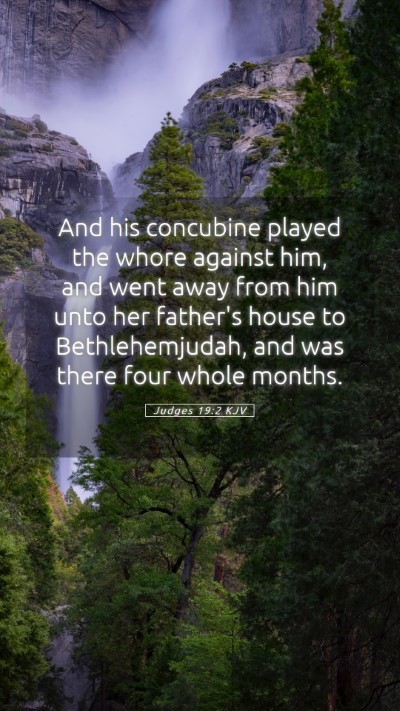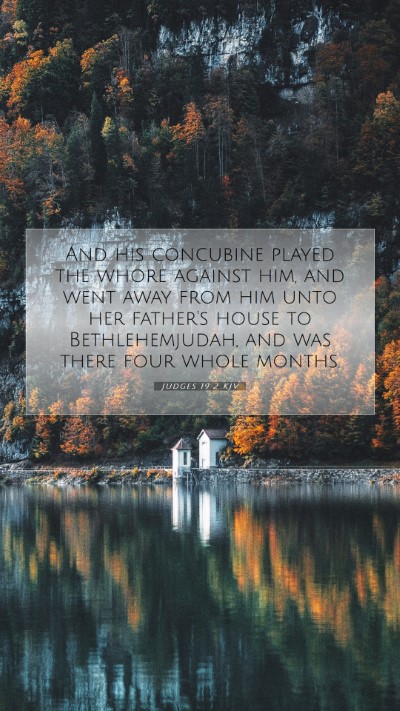Bible Verse Meaning and Interpretation: Judges 19:2
Bible Verse (Judges 19:2): "But his concubine played the harlot against him, and went away from him unto her father’s house to Bethlehemjudah, and was there four whole months."
Overview
This verse introduces a troubling narrative in the Book of Judges, a period marked by moral chaos and spiritual decline in Israel. The phrase "played the harlot" indicates unfaithfulness, drawing attention to themes of betrayal and the complexities of relationships. This initial action sets the stage for a series of events that lead to severe consequences within the story.
Insights from Public Domain Commentaries
1. Matthew Henry's Commentary
Matthew Henry highlights the moral implications of the verse. He points out that the act of the concubine signifies a breach of trust. By abandoning her husband, she not only disrespects their union but also disrupts the covenantal relationship expected in marriage. This disloyalty is emblematic of a broader spiritual infidelity that was characteristic of Israel during this time, illustrating the societal and personal consequences of turning away from God’s principles.
2. Albert Barnes' Notes on the Bible
Albert Barnes emphasizes the cultural context of concubinage in ancient Israel. He explains that while a concubine had a lower status than a wife, her departure was still significant and indicative of deep issues within familial and societal structures. Barnes notes that the journey to her father's house signifies a return to familiar safety, yet it also reveals the disarray and conflict prevalent in Israelite society, as loyal familial bonds are challenged by personal grievances and societal decay.
3. Adam Clarke's Commentary
Adam Clarke provides a detailed examination of the geographical and historical aspects of the verse. He contextualizes Bethlehem as a place of heritage for the Israelites, linking it to their ancestral roots. Clarke suggests that the concubine's choice to return there hints at a longing for stability amid chaos. Moreover, he addresses the symbolism of her journey back, signifying not just physical distance but also a spiritual retreat, reflecting the broader national state of Israel during this era of disobedience and moral ambiguity.
Key Themes and Lessons
- Betrayal and Trust: Judges 19:2 presents the theme of betrayal within intimate relationships. The concubine's actions raise questions about fidelity and the consequences of breaking trust.
- Cultural Reflections: The portrayal of concubinage and its societal implications invites readers to reflect on how cultural practices impact moral decisions and individual relationships.
- Spiritual Decline: The verse acts as a metaphor for Israel's spiritual descent. The personal decay mirrored in the narrative reveals the broader disconnect from God's commandments and the decline in moral standards.
- Seeking Refuge: The return to her father's house symbolizes a search for comfort in times of distress, echoing the human desire for safety and belonging, especially when facing personal turmoil.
Application to Daily Life
Understanding the implications of Judges 19:2 can offer valuable insights for personal growth and relationships. Here are some applications:
- Fidelity in Relationships: The verse serves as a reminder to honor commitments and the significance of trust in any relationship.
- Understanding Cultural Influences: It encourages individuals to contemplate how cultural norms can strain personal relationships and to seek alignment with moral values.
- Spiritual Reflection: Readers are invited to reflect on their spiritual lives, identifying areas of decline and seeking restoration.
Cross References
- Hosea 3:1 - A reflection on unfaithfulness in relationships.
- Deuteronomy 21:15-17 - Discussing inheritance rights and family structures.
- Matthew 5:32 - Jesus' teachings on divorce and marital fidelity.
Conclusion
Judges 19:2 reveals profound truths about human relationships, societal norms, and the consequences of spiritual neglect. Through interpreting this verse alongside reputable commentaries, readers can gain a deeper understanding of its significance, apply its lessons to contemporary life, and engage in meaningful Bible study.


